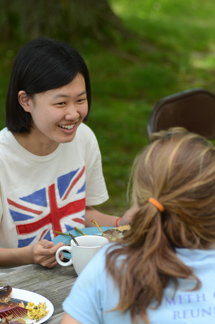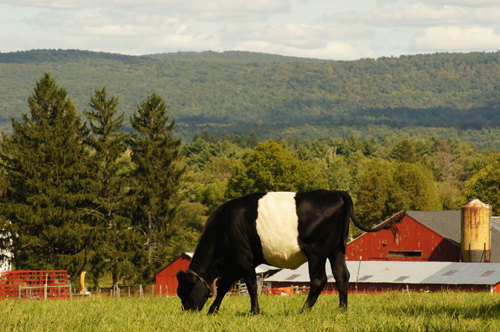Arriving on the Hampshire College campus to take part in the summer 2013 Food, Farm and Sustainability Institute, Enli Li and Mengxiao Wang found themselves immersed in a new culture.

Mengxiao Wang eats with fellow students during the Food, Farm and Sustainability Institute’s community lunches.
The two students from Anhui Agricultural University in China participated in the six-week Institute through a grant from the Henry Luce Foundation’s Luce Initiative on Asian Studies and the Environment. Administrators at the University, a longtime partner in Hampshire’s China Exchange program, are particularly interested in learning how to develop an agricultural program within an undergraduate liberal arts curriculum, as Hampshire has successfully done for decades.
For Li and Wang, better known as Lyric and Sylvia among Institute participants, it was an opportunity to experience Hampshire’s program first-hand.
“Organic farming isn’t very popular in China,” said Li, a third year student at the University. “This is all new to me. I think it’s interesting.”
From June 3 through July 12, the Institute provided a wide variety of learning opportunities for participants. This included farm duties with farm manager Leslie Cox and CSA program manager Nancy Hanson, classroom work and research projects with faculty like entomology and ecology professor Brian Schultz, Asian studies professor Kay Johnson, physiology professor Cindy Gill, and microbiology professor Jason Tor, and field trips to area farms and other relevant locations.
“I talked a lot about food with Cindy,” said Li, whose academic focus at Anhui Agricultural is largely on addressing issues of food quality in China. “We can hardly ever find organic food in a Chinese supermarket. People here seem to like to buy local. I talked to my uncle and friends about organic agriculture, and they say China is different, because there’s such a huge population. But in the future, China may change the agricultural style to be more organic. It’s good for human health, and good for the environment.”
In China, Wang has focused on laboratory experimentation, with recent work centered on extracting polysaccharides from different types of fungus. Her final project at the Food, Farm, and Sustainability Institute focused on optimizing the process of fermentation in yogurt.
She noted that her time at the Institute formed many lasting impressions. Learning about sustainability, tackling the chores at the farm center, studying soil composition and the carbon cycle, and conducting experiments in Hampshire’s science labs gave her a varied experience. It was the hands-on learning, though, that made the biggest impact. Whether that was seeing the many types of weeds that grow in the fields to making compost, Wang feels that her participation in the Institute was invaluable.
‘I feel very happy living here. I’ve made a lot of good friends, and had some very nice professors,” she said.
Li and Wang’s visit was part of a larger, multifaceted 18-month project: The $50,000 Luce grant is supporting interdisciplinary connections built around a theme of food, sustainability, and climate change in East Asia. A group of Hampshire faculty in Asian studies and in the natural sciences is exploring teaching and research possibilities that build stronger curricular bridges amongst these varied fields.





